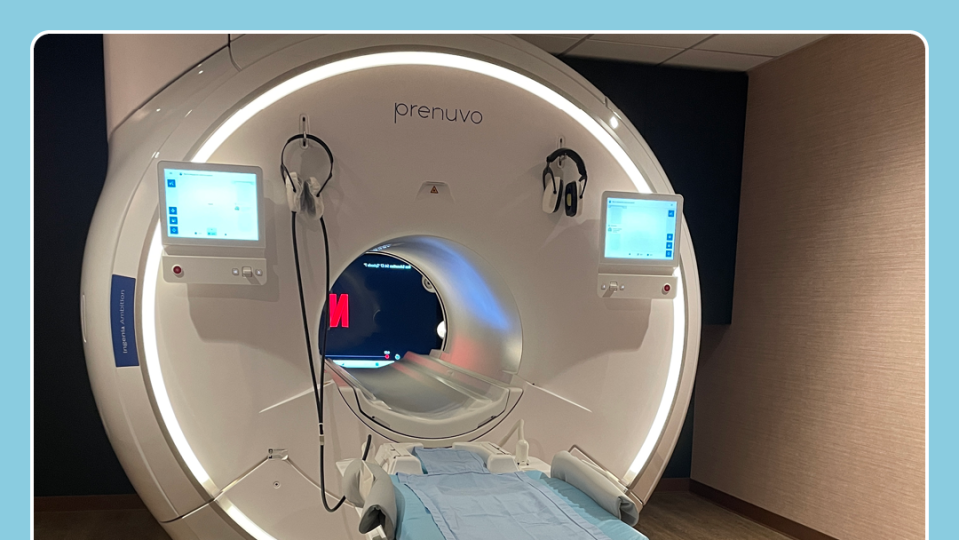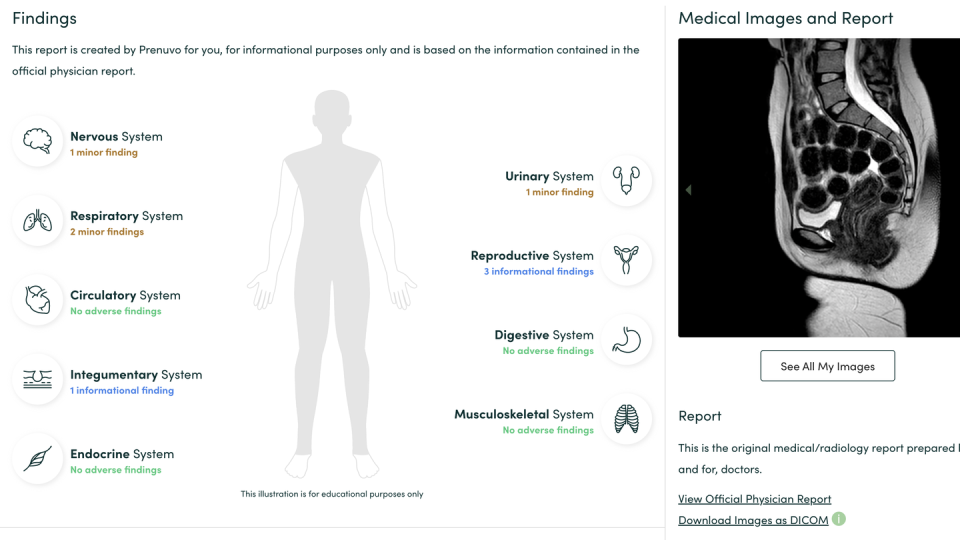‘I Tried The Prenuvo Full-Body MRI Scan—And It Put Me At Ease About My Future Health’

I’ve always been in tune with my body. But at some points, I’ve become a little bit too in tune, which has led to some overthinking, and a bit of health anxiety.
However, in recent months, I’ve channeled my anxiety into more of a curiosity about how my body works. So, when I got the chance to try Prenuvo—the trendy full-body MRI scan that’s been all over Instagram influencers' and celebs' feeds—it was a no-brainer.
Before I dive in, here’s a little background: I’m 23 years old and consider myself to be pretty healthy. I’ve have been active my whole life, playing sports and dancing during my childhood. Since college, I’ve been strength training five to six days a week, plus running.
I’m extremely grateful to have never experienced any major health scares, despite a fractured bone here and there, and a mildly slipped vertebrae in my lower back. I do my best not to take my health for granted, and I loved learning more about it through my scan. I acknowledge that getting this scan is a major expense, and a privilege, as their scan prices start at $1,000.
I should also note that not all experts think a full-body MRI scan is totally necessary. In fact, it's possible they can actually have some downsides. “One of the notable concerns is that screening your whole body could leave you with a false positive,” said internal medicine physician and WH advisory board member Keri Peterson, MD. And the American College of Radiology (ACR) doesn't justify recommending "total body screening for patients with no clinical symptoms, risk factors, or a family history suggesting underlying disease or serious injury." But on the flip side, you also might feel pretty confident about your health if your results are good.
Ahead, read up to learn all the details on my experience with Prenuvo.

I was a bit nervous before my scan, but it ended up feeling like a pretty luxury MRI experience.
However, in terms of my health, I figured that if the MRI detected anything bad, it would be better to know earlier. But health anxiety aside, I can also get claustrophobic. (In fact, another WH editor opted out of her appointment right before she went into the machine due to a sudden onset of claustrophobia! Something to keep in mind if you aren't comfortable feeling enclosed in a small space.)
Fortunately, I had recently gotten an MRI for my lower back pain a few months earlier. So, I knew what to expect. Since Prenuvo’s scan is of the full body, it takes 50 to 75 minutes, but they provide options for entertainment, including listening to music or watching Netflix.
When I walked into the office, I was surprised at how nice it was in comparison to normal medical practices. There was calming music, and it kind of felt like a spa. The staff had me change into scrubs in my own private room that locked where I kept my belongings. Then, I went in for the scan. The MRI machine looked pretty standard, except that there was a screen with Netflix queued up.
The facilitator put a weighted cover (almost like a blanket) over my legs and chest so I stayed still. Then, she put a mask over my face with a mirror and headphones so I could see and hear the Netflix show. She also put a panic button in my hand.

The scan felt long, but I was relaxed and even fell asleep at one point.
While you can opt to take a sedative before your scan, I didn't find that necessary for my experience, and was able to relax naturally. I was moved in and out of the machine so different areas of my body could be scanned during the experience.
When my lungs were scanned, the facilitator had me do breathing exercises, including taking deep breaths and holding it, so my lungs could stay still for the images. The facilitator guided me through the process, saying how much time I had left, and overall, it took about an hour.
My only complaint: At some points, it was a bit hard to hear Netflix playing when the MRI machine noises were loud. Also, despite feeling a bit uncomfortable in the machine—as you would during any MRI scan—it was as good as any MRI experience could be.
My results report was easy to read.
The staff told me that I’d get my results back in five to 10 business days, but I got them back in less than one business day via their online portal. Overall, I was happy with and relieved about my results. The report broke down my scan into informational findings, which was info about my breast tissue composition and endometrial thickness, and minor findings, which might be something abnormal.

A few days after my scan, Prenuvo set up a call with a nurse practitioner to break down my results, then they scheduled a tentative date for a follow-up scan based on my results (mine is in 2025). I chatted with Philana McDonald, FNP-BC, a California-based board-certified family nurse practitioner for Birch Medical, who confirmed that my scan results were normal for my age.
Here are the health findings that my Prenuvo scan uncovered.
A Deviated Nasal Septum And Mucous Retention Cyst
In my sinuses and mastoids, I had two minor findings. I had no idea that I had a deviated nasal septum—they usually result from some sort of trauma to the nose, but can also be genetic—so I think I inherited mine from my dad. A deviated nasal septum doesn’t necessarily cause any symptoms except for difficulty breathing, which, fortunately, hasn’t been an issue for me. “It’s pretty common,” McDonald says. There's no treatment needed, unless I have trouble breathing.
They also found a seven-millimeter lesion consistent with a mucus retention cyst, which is “a benign cyst with mucus that we commonly see in the sinus regions,” she adds. They spontaneously come and go on their own, and most people don’t have symptoms from them. (Some symptoms, though, could be congestion from allergies.)
Kidney Renal Lesion
In my left kidney, they found a renal lesion consistent with a cyst about 0.4 centimeters in diameter. It’s a benign finding, and unless I have pain or blood in my urine (which I haven’t experienced before), no follow-up is required. “Many people acquire these just over time with age,” McDonald says, adding that the liver and kidneys are the most common organs where people develop cysts. (They can even be from birth.) “Typically, a majority of cysts are harmless.” These cysts usually don’t change or transform or affect kidney function.
One major pro of the Prenuvo scan: They use diffusion weighted imaging, which can actually distinguish between things that are solid and fluid-filled. So, if someone has a complex-looking cyst that might have a solid component to it, they’ll want to look closer at it. However, not all solid cysts are dangerous.
Spine Hemangioma
They also detected a hemangioma, which is a benign growth filled with blood and blood vessels, in the T10 vertebrae of my thoracic spine. These typically won’t cause pain or grow, so because I’m asymptomatic, no action is necessary.
Areas with no adverse findings:
Brain (they can see small aneurysms, tumors, cysts, the six arteries, and brain volume)
Nasal pharynx
Oral pharynx
Hypopharynx
Thyroid (they can see if it’s too large or small, as well as any nodules)
Cervical lymph node chain (they can see inflammation)
Lungs and mediastinum (they can see lymph nodes)
Heart and great vessels (they can see whether the heart is enlarged and if there are any aortic aneurysms, but MRIs don’t show blockages or coronary arteries)
Esophagus
Stomach
Liver (they can see if the liver is enlarged or it’s a fatty liver)
Gallbladder and biliary system (they can see gallstones and bile ducts)
Pancreas (they can see masses and the size of the pancreatic duct because if it’s enlarged, it can be a sign of obstructions or pancreatic cancer in certain cases)
Spleen
Adrenals
Bowel (they can see inflammation, masses, thickening of the intestinal wall, and lymph nodes in the small and large intestine)
Bladders and ureters
Sacroiliac joints (they can see arthritis, fluid, swelling, and cysts, but they can’t see if a person has a tear in cartilage or a ligament)
Shoulders
Pelvis and hips
Knees
Ankles
Bony skeleton and soft tissue

All in all, this scan was an awesome way for me to check in with my body.
I’m so grateful my scan was able to pick up on these minor findings, since there was no further action I had to take on any major health concerns. I now have more peace of mind about my health, and will think about my minor health findings—like my deviated septum—as I see how things progress and change in my next scan.
The Prenuvo scan has detected potentially life-impacting conditions in one out of every 20 patients, according to their public relations group. In 2022, they were able to provide information for over 2,500 significant conditions for users to monitor and act upon. So, it's way more likely to have a "normal" scan without any major takeaways, as 95 percent of their scans for users didn't pick up significant health findings. I'm grateful to be in that group. But it's wonderful that the 5 percent of those with significant health findings were able to be more proactive for their health through this scan.
You Might Also Like

